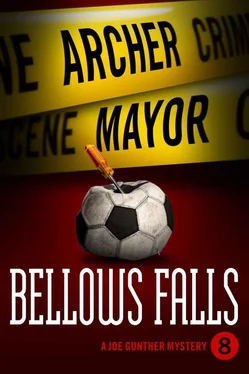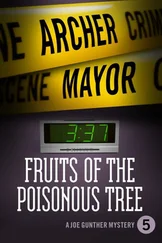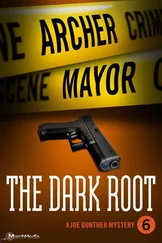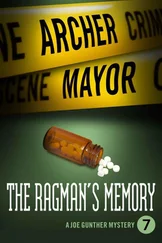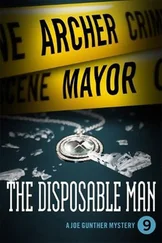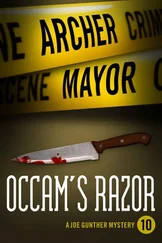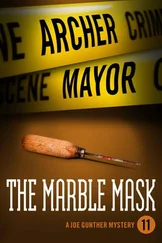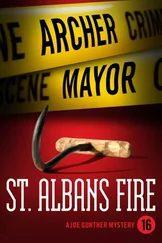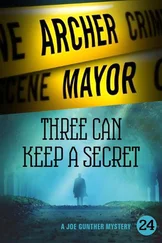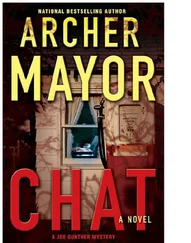Archer Mayor - Bellows Falls
Здесь есть возможность читать онлайн «Archer Mayor - Bellows Falls» весь текст электронной книги совершенно бесплатно (целиком полную версию без сокращений). В некоторых случаях можно слушать аудио, скачать через торрент в формате fb2 и присутствует краткое содержание. Год выпуска: 1997, ISBN: 1997, Издательство: MarchMedia, Жанр: Полицейский детектив, на английском языке. Описание произведения, (предисловие) а так же отзывы посетителей доступны на портале библиотеки ЛибКат.
- Название:Bellows Falls
- Автор:
- Издательство:MarchMedia
- Жанр:
- Год:1997
- ISBN:9781939767004
- Рейтинг книги:5 / 5. Голосов: 1
-
Избранное:Добавить в избранное
- Отзывы:
-
Ваша оценка:
- 100
- 1
- 2
- 3
- 4
- 5
Bellows Falls: краткое содержание, описание и аннотация
Предлагаем к чтению аннотацию, описание, краткое содержание или предисловие (зависит от того, что написал сам автор книги «Bellows Falls»). Если вы не нашли необходимую информацию о книге — напишите в комментариях, мы постараемся отыскать её.
Bellows Falls — читать онлайн бесплатно полную книгу (весь текст) целиком
Ниже представлен текст книги, разбитый по страницам. Система сохранения места последней прочитанной страницы, позволяет с удобством читать онлайн бесплатно книгу «Bellows Falls», без необходимости каждый раз заново искать на чём Вы остановились. Поставьте закладку, и сможете в любой момент перейти на страницу, на которой закончили чтение.
Интервал:
Закладка:
Prominent above downtown is Cherry Hill, an oblong rise bisecting the village, and jammed with an assortment of schools, churches, a cemetery, and some of the town’s famous and ubiquitous white clapboard housing-both pleasant Greek Revival single-family homes and several squalid three-deckers, bursting at the seams with down-and-out tenants.
Skirting Cherry Hill’s western slope, Atkinson parallels Rockingham Street but is overwhelmingly lined with residential buildings. It exposes the village’s social extremes most clearly, with some of its more spectacular mansions snuggling up to the seediest flophouses. Atkinson, and the side streets extending across a narrow flat section to its west, are where the vast majority of the town’s inhabitants live. It is a beehive-like neighborhood-rich, poor, elaborate, and plain-virtually crawling with people and stamped by their passage. Toys, bikes, cars abandoned and functional, swing sets, birdbaths, and assorted debris all lie scattered among the houses like yard sale rejects. More vivid than the dramatic setting, overwhelming the spectacular architecture, is the sense of people in this town. They appear to live everywhere, as on an overloaded riverboat.
Predictably, from what Latour had portrayed, Bouch had chosen this area to call home.
His house was easy to spot, being marked by a backhoe and a gravel truck, both looking the worse for wear. But it was the Harley that caught my eye-and the man working on it.
Dressed in jeans, a T-shirt, and work boots, Norm Bouch at first glance looked like any other working-class male, his head buried in a motor and his hands covered with grease. But as I drove slowly by, I noticed the precision with which he handled his tools and the perfect balance he maintained as he moved. Like a relaxing predator, he showed confidence and grace and exuded an indefinable sense of menace.
That sensation was confirmed a moment later, when a ball came soaring over the garage roof from the backyard and bounced harmlessly against the motorcycle. A screwdriver still in his hand, Bouch picked up the ball and began circling the garage, just as a small boy appeared at its far corner, running full tilt. Both of them froze in their tracks as they caught sight of each other. I could no longer see Bouch’s face, but the boy’s paled with fright, and he began wringing his hands with practiced intensity.
I stopped the car and continued watching, seeing the boy speaking quickly, no doubt begging forgiveness for the ball’s sudden intrusion. Bouch held it up as if discovering it for the first time and turned it admiringly in his hand. Then in one fluid movement, he stuck it with his screwdriver and tossed it half-deflated at the boy’s feet. The child looked down forlornly and slowly stooped to pick it up. Bouch was already heading back to the Harley, a smile on his face.
I resumed driving down the street, unnoticed-and wishing to remain that way.
I didn’t want to interview Norm Bouch-not yet. Internal investigations are ticklish affairs. The cops tend to see you as a potential traitor, and the civilian complainants as a guaranteed whitewasher. So despite the pressure from both camps to come up with results, and a tradition that dictates interviewing the complainant and witnesses first before doing the peripheral homework, I tend to favor a more roundabout method. By approaching the problem from the outside, collecting knowledge on the way in, I often end up with a pretty complete picture before even meeting the primary players.
It’s unorthodox, slower, and it makes twitchy officials twitchier, but it gives me a better sense of what I’m getting into.
I therefore drove past to a nearby convenience store, parked in its lot, and sat like a bird-watcher taking notes from the bushes.
The Bouch home was a two-story, ramshackle, turn-of-the century clapboard pile, probably quite tidy and small when original, now a typical cob job of artless additions and alterations. New England is dotted with such buildings, where the amendments have all but swallowed the original. Norm’s was adorned with the mismatched roof lines, bare sheathing, and patched-on sagging porch exemplifying the least of such examples. The yard was a similar mess-cars, broken toys, a washing machine, and assorted jetsam all vied for space. From my vantage point, I could partially see into the backyard, where the small boy was still holding the flattened ball, but was now surrounded by several other unhappy children.
A quarter hour later, a pickup truck on testosterone pulled to the curb in a roar of doctored mufflers, and a heavyset man in a tight tank top swung out to join Bouch by the side of the Harley. Bouch greeted him with a laugh, handed him a beer from a nearby cooler, and engaged in animated conversation, still working on his bike. I didn’t doubt that in the heat of a summer afternoon, variations of this scene were being duplicated a millionfold across the country.
I have long passed the point of expecting people to look their parts. Emile Latour’s uniformed, round-bodied look of benevolent, innocuous authority hid an anger I’d sensed simmering just below the surface. What I was watching now, I knew, could be anything-two guys bonding over beer and the Harley mystique, or two drug dealers discussing business in a totally placid setting.
Brian Padget lived in Westminster, several miles south of Bellows Falls. But where most Vermont towns appear sprinkled across a picturesque and hilly topography, Westminster sits on a flat terrace of land, its rigidly placed buildings straddling a wide, straight, smooth stretch of road more conducive to speeding than to the leisurely enjoyment of a small, quaint village. The details of the latter are there, of course-the town predates the American Revolution. But the sturdy, classically built homes and businesses are dwarfed by the numbing, methodical way in which they were laid out, and the overall impression of Westminster remains an anonymous blur.
Padget’s house was a single-story converted trailer at the edge of town, tightly wedged between two similarly built neighbors. The tiny lawn was cut and trimmed, the one bush out front neatly pruned, and the vinyl clapboards of the house looked freshly washed. I knew from Latour that Padget wasn’t home-he was out of town visiting his folks for the day. As with the Bouch residence, all I was after here was a first impression of the people I was about to investigate.
Padget’s home was the precise opposite of Bouch’s-on the surface, it spoke of precision and attention to detail, but under that was a concern for appearances, a sense of others standing in judgment. It reflected an underlying insecurity typical of a young unmarried man, who was both relatively new on the job and eager to impress.
Bouch, on the other hand, had seemed more comfortable with himself. The self-confident blue-collar squalor of his home had been as eloquent as Padget’s cautious ambition. I sensed Norm was positioned to take advantage of the world around him, whereas Brian was more dependent on the blessings of those with clout.
It made me ponder the forces that had set these two people in opposition. “Sexual harassment,” like a foghorn in the night, covered a range of possibilities-from a mere disturbance to a warning of catastrophe. I didn’t have Emile Latour’s confidence that the former was preordained.
Chapter 3
SERGEANT GREG DAVIS HAD been with the Bellows Falls Police Department for seventeen years, a record broken only by his chief. Unlike Latour, however, Davis was an extrovert, stimulated and satisfied by his job. He relished the learning process, in whatever form, and made an effort to attend any conference or meeting he could to pick up pointers and make contacts. As a result, he was both well known and well liked throughout the state.
Читать дальшеИнтервал:
Закладка:
Похожие книги на «Bellows Falls»
Представляем Вашему вниманию похожие книги на «Bellows Falls» списком для выбора. Мы отобрали схожую по названию и смыслу литературу в надежде предоставить читателям больше вариантов отыскать новые, интересные, ещё непрочитанные произведения.
Обсуждение, отзывы о книге «Bellows Falls» и просто собственные мнения читателей. Оставьте ваши комментарии, напишите, что Вы думаете о произведении, его смысле или главных героях. Укажите что конкретно понравилось, а что нет, и почему Вы так считаете.
